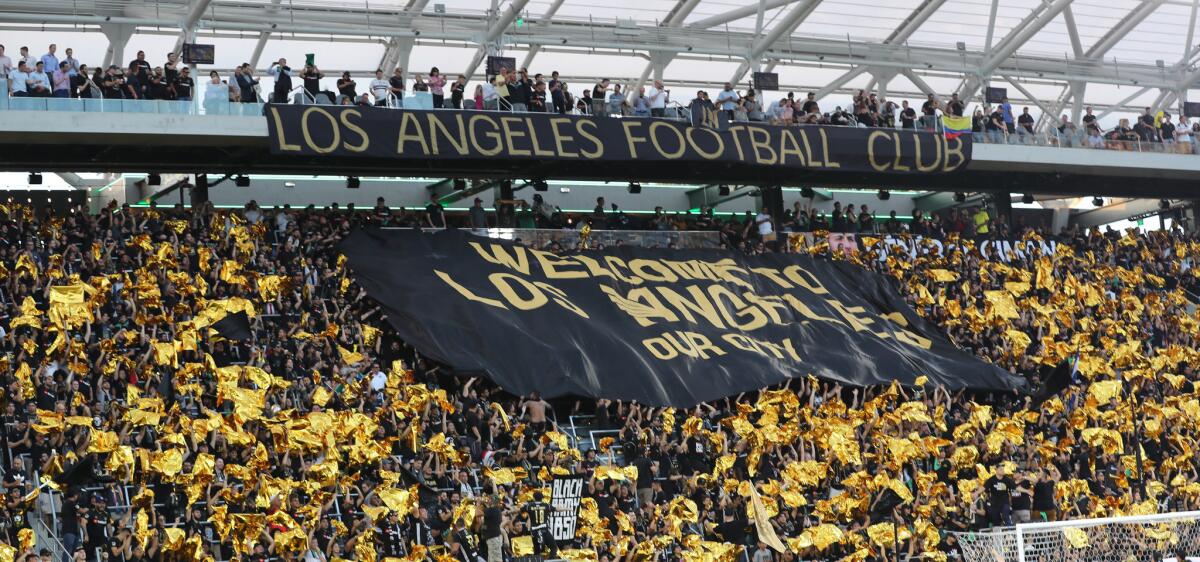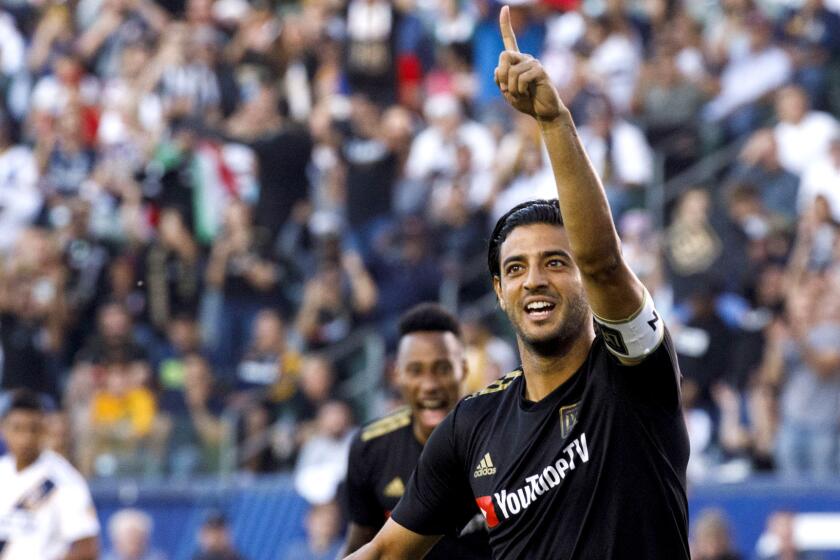As LAFC rises, so do team’s tickets, already the most expensive in MLS

- Share via
Joris Drayer has attended just one soccer game at Banc of California Stadium. But he came away impressed.
“It’s a great stadium. There’s a great environment,” he said. “The brand itself is really trendy. You see a lot of people wearing the gear.
“I think they’re doing a lot of the right things.”
But he didn’t pay for the tickets, which he acknowledges probably colored his fan experience. Others aren’t so lucky.
LAFC is just midway through its second season, yet its average ticket price of $49.64 is more than 13% higher than any other MLS team. Figure in the cost of parking, food, beverages and souvenirs, and a Team Marketing Report survey says it would cost a family of four nearly $340 to attend an LAFC game.
Next season it will cost even more, since the team is raising ticket prices in some sections by as much as 20%. Average ticket prices for the Galaxy, who play 11 miles away in Carson, are below the league average at $33.62, with some season packages starting at about half that amount per ticket. Among major professional sports teams in Southern California, only the Angels charge less.
So as a professor of sports marketing at Temple University, Drayer has some questions about LAFC’s pricing strategy.
Diego Rossi and Carlos Vela score two of LAFC’s goals in a 4-3 victory over the defending MLS champion Atlanta United.
“Teams really get one chance to kind of set prices,” said Dreyer, who has done detailed research on sports pricing and consumer behavior. “As a new team they had an opportunity, playing in a new stadium as a new franchise, to really capitalize on the initial novelty of the organization. The challenge is if you set prices too low at the beginning, it becomes really difficult to have pretty significant price changes year over year.
“Fans, as much as they hate high prices, they probably hate price changes even more.”
Just ask Matt Williams. He and his wife, season-ticket holders from the start, paid $35 a seat during LAFC’s first season. The team, which concluded midway through that first season that its tickets were underpriced, upped the cost of the same seats to $55 this year. That number will go up again, to $65, for 2020.
“It seemed like a really good deal in Season 1,” Williams said. The second increase, he said, was “kind of a slap in the face.” Other fans said it felt like price gouging.
But while many season-ticket holders have complained, few have given up their seats.
“At this point, they’ve kind of got me,” Williams said. “I wouldn’t sign up for it today if it were at the prices it’s at. But because of the experience I’ve had and because I know the people that are in the seats around me, I’m going to continue.”
That would suggest LAFC is neither slapping faces nor gouging, but rather following that good old capitalist principle of supply and demand. The team has sold out all 28 MLS regular-season and playoff games it has played at Banc of California Stadium, meaning there is a demand. And LAFC is limiting the supply by capping season-ticket sales at 17,500 despite a growing waiting list to join. Instead it has priced 20% of the seats in its 22,000-capacity stadium at $28 or less.
“It’s not about maximizing your revenue or thinking exactly how much can we get,” LAFC president Tom Penn said. “It’s more about what’s fair to the people that helped get us here and that are first-time season-ticket holders.
“The demand is there. We could have raised prices higher and still been fine with our demand.”
Chris Hartweg, the chief executive and publisher of the Team Marketing Report, said there are other factors that have allowed the team to raise prices without depressing demand. LAFC plays in a handsome, modern, downtown stadium accessible by public transportation, for example, and it has the best record in MLS.
LAFC’s Carlos Vela has been chosen captain of the MLS All-Star team for a second consecutive season in a vote conducted on social media.
“It’s worth a little more because it’s a good product. And other than the game, it’s a good experience,” he said. “We look at a lot beyond just the straight numbers. LAFC did a nice job of really gaining instant credibility in the marketplace. People feel welcomed and have their place with this team.
“Every game’s a sellout. You can’t do better than that.”
But you can do worse.
“That’s the tightrope that the teams have to walk,” Hartweg said. “Where is that tipping point where you go from a waiting list to having unsold season tickets?
“You don’t want to erode that core fan passion. So they’ve got to stay close to that.”
Hartweg and Dreyer say the equation for the Galaxy is more complicated. An original MLS franchise playing in a 16-year-old stadium, they do not benefit from novelty or newness as LAFC does. And, though they are the winningest team in MLS history and own a league-record five titles, the Galaxy haven’t made the postseason since 2016.
Average attendance at Dignity Health Sports Park has fallen by about 2,250 a game since then, despite ticket prices that are a third lower than LAFC’s.
Team spokesman Brendan Hannan said the Galaxy season-ticket base is 10,500 in a 27,000-seat stadium. And while there will be some “nominal” increases for next season, prices will remain flat in most sections.
“We’ve been L.A.’s team for the past 24 years,” Hannan said. “We think that our product is affordably priced. I still believe that we offer the best experience in town.”
Penn goes that one better, calling the experience of a game at Banc of California Stadium “the best in American pro sports.”
The question is how much should that cost?
More to Read
Go beyond the scoreboard
Get the latest on L.A.'s teams in the daily Sports Report newsletter.
You may occasionally receive promotional content from the Los Angeles Times.









